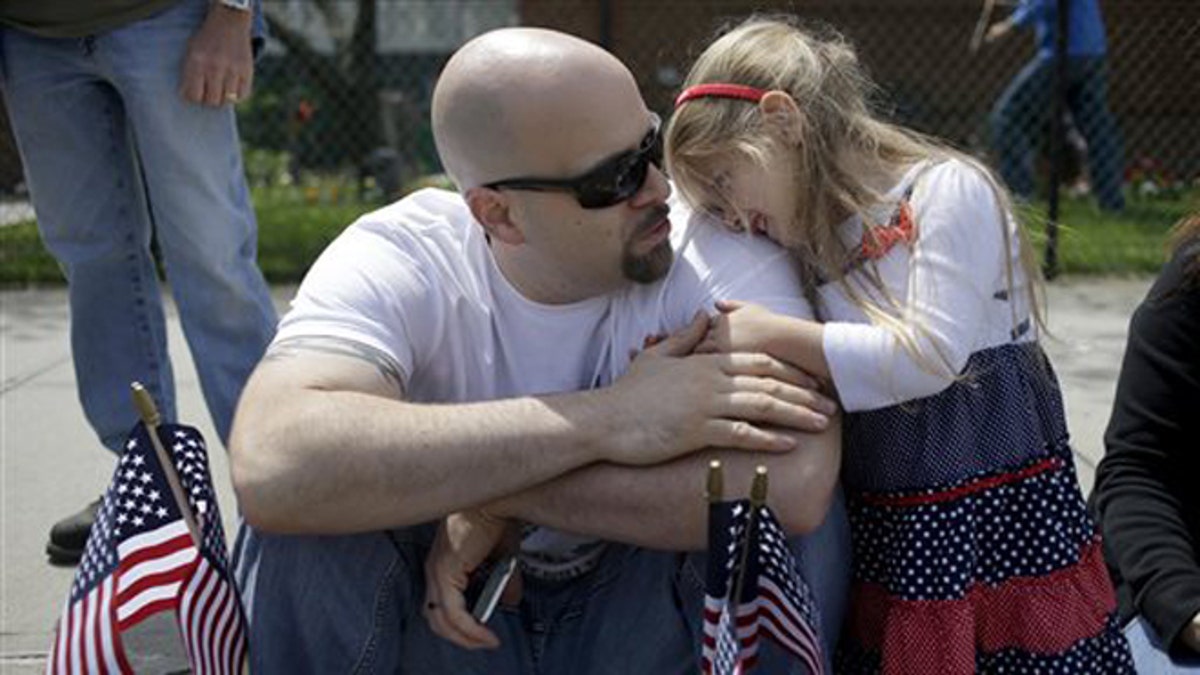
FILE -- Carol Brandt, 3, right, talks with her father Matthew Brandt during the College Point Memorial Day Parade in New York. (AP Photo/Seth Wenig)
Father’s Day 2013 arrives on Sunday. Here’s what we have to show for it: According to a survey conducted by Today Moms, more than half of the 7,000 mothers polled feel more stressed out by their husbands than they do by their kids.
Imagine if the “Today Show” had polled men instead and the response was the same: “More than half of all husbands feel more stressed out by their wives than they do by their kids.”
That would never happen. Not because it’s never true, but because men don’t tend to point fingers—particularly at their wives.
When pressed, however, they will tell you what they want. In a 2012 "Today Show" survey of 1,500 dads, two-thirds of the respondents said what they want most from their partner is “a little verbal acknowledgement.” In other words: respect.
[pullquote]
It should be noted that these polls are from the “Today Show” not Gallup. But that doesn’t make the findings insignificant. The results are, in fact, commensurate with my research on marriage and family dynamics. It is simply indisputable that women with children have become more stressed over the past decade—and that all too often they blame their husbands as the source of their discontent.
“We can’t be expected to raise children, bring home the bacon, and take care of our husbands!” women say. It’s all too much.
Indeed it is. But are men to blame? After all, they didn’t demand society change the rules so drastically. Women did.
In the past, taking care of a husband was something women did with pride. Today, it’s done—if it’s done at all—with resentment. The implication seems to be, “My husband is a grown man! He can take care of himself!” If that is how you feel, then what you’re saying is that a marriage should take care of itself.
But it can’t. A marriage is like a garden: if you don’t tend to it, it will die. Taking care of one’s spouse is part of the deal—and men don’t mind one bit. They love taking care of their wives. In exchange, however, they want to feel needed. And they don’t.
This gender dynamic is lost on modern women, who pride themselves on being strong and independent. But those qualities can undermine love. As Steve Harvey wrote in “Act Like a Lady, Think Like a Man,” “If you’ve got your own money, your own car, your own house, a Brinks alarm system, a pistol, and a guard dog, and you’re practically shouting from the rooftops that you don’t need a man to provide for you or protect you, then we will see no need to keep coming around. What in the world do you need us for if you have all of that?”
For months Americans have been dissecting the changing role of women and its effect on gender relations. The conclusion seems to be that men are threatened by women’s independence.
I disagree.
Men are happy to have women out doing their thing. What does threaten is the implication—or worse, assertion—that men bring nothing of value to the table. “Men know women are powerful, and we don’t mind that one bit. It empowers us that you’re empowered,” writes clinical psychiatrist Paul Dobransky, M.D. “Unless, that is, you disempower us in order to feel empowered.” And there it is.
It’s time to admit the truth: the so-called rise of women has come at men’s expense. Men have been disempowered.
If what I’m saying is true, you ask, then what is the solution? To turn back the clock? No—that’s impossible. (Though I do believe the one-income family, which offers a notably stress-free lifestyle, will make a comeback—the difference being that more and more dads will be the ones to stay home, which I think is a great compromise to the relentless work/family conflict.)
What I am saying is that women must be cognizant of how they use their newfound ambition. If a woman’s desire for independence is used to suggest, either verbally or non-verbally, that men are superfluous—or that a husband is just one more child to take care of—love will remain elusive. No one wants to feel like a nuisance.
So this Father’s Day, let’s give men what they want: respect. Instead of complaining about what husbands and fathers don’t do, let’s honor them for what they do do—and see if that exchange doesn’t translate to a happier, less stressful home.







































